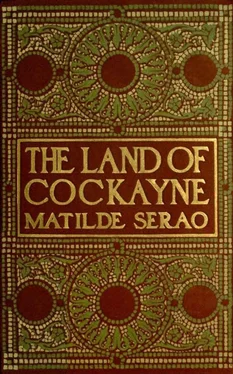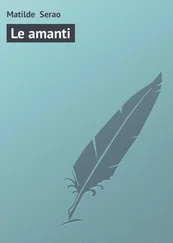Matilde Serao - The Land of Cockayne
Здесь есть возможность читать онлайн «Matilde Serao - The Land of Cockayne» — ознакомительный отрывок электронной книги совершенно бесплатно, а после прочтения отрывка купить полную версию. В некоторых случаях можно слушать аудио, скачать через торрент в формате fb2 и присутствует краткое содержание. Жанр: unrecognised, на английском языке. Описание произведения, (предисловие) а так же отзывы посетителей доступны на портале библиотеки ЛибКат.
- Название:The Land of Cockayne
- Автор:
- Жанр:
- Год:неизвестен
- ISBN:нет данных
- Рейтинг книги:3 / 5. Голосов: 1
-
Избранное:Добавить в избранное
- Отзывы:
-
Ваша оценка:
- 60
- 1
- 2
- 3
- 4
- 5
The Land of Cockayne: краткое содержание, описание и аннотация
Предлагаем к чтению аннотацию, описание, краткое содержание или предисловие (зависит от того, что написал сам автор книги «The Land of Cockayne»). Если вы не нашли необходимую информацию о книге — напишите в комментариях, мы постараемся отыскать её.
The Land of Cockayne — читать онлайн ознакомительный отрывок
Ниже представлен текст книги, разбитый по страницам. Система сохранения места последней прочитанной страницы, позволяет с удобством читать онлайн бесплатно книгу «The Land of Cockayne», без необходимости каждый раз заново искать на чём Вы остановились. Поставьте закладку, и сможете в любой момент перейти на страницу, на которой закончили чтение.
Интервал:
Закладка:
The Marchioness had picked up her velvet bag and crossed her hands over it—a torpor came over her, and she looked like an old sleeping mummy; whilst Signora Parascandolo, with her head down, gazed abstractedly at her fan, a precious antique her husband must have got from some desperate debtor by forced sale. Luisella began to feel very much bored between these two silent women; her lively temperament made her feel inclined to get up and speak to her friends and relations, still more to go and see what Agnesina was doing, and what was going on in the kitchen and the dining-room to cause such a noise; but her post of honour was on the divan—it would have been a breach of etiquette to leave it; so she went on being bored, smiling to her friends at a distance, and waving her gold-spangled fan. All at once, she called her husband—she could stand it no longer—and whispered to him; he nodded assent and went off to arrange the procession. The guests, knowing the usual programme, understood, and began looking towards the door, occasionally, for another part of the show to begin. Some affectionate smiles began already; a slight whisper ran along. The procession appeared at the chief door. Little Agnesina, in a white cap with pale blue ribbons that made her face quite red, wore an embroidered batiste robe that covered the pink little hands. She was laid out on a portabimbi of pale blue silk and lace, her head raised on a cushion; this forms a bed, a cradle, a bag, and a garment, all in one; it lay on the strong arm of the Fratta Maggiore nurse, Gelsomina, who carried it with the deepest devotion, as a cleric carries the missal from one end of the altar to the other, not taking her eyes off Agnesina, who stared placidly at her with the clear crystal eyes of a new-born infant. Beside her was Donna Candida, all in the gravity of her office; to mark its continuity she laid her hand on the baby's pillow; then followed the father, Cesare Fragalà, and a little further back the waiters with trays of candy, sweets, and dried fruits, caramels, jujubes, then other trays with marsala, malaga, Lunel; and farther back still, venturing to peep in, some inquisitive servant gazing with open eyes.
The christening-party was not unexpected; the guests all knew the baby would be shown, so long, noisy applause greeted it, with a clapping of gloved hands, and a chorus burst out:
'Long live Agnesina!'
'May you grow up holy!'
'How lovely, how sweet she is!'
'Agnesina! Agnesina!'
'Cheers for Agnesina's papa and mamma!'
In the meanwhile the baby was carried straight to her godmother, the Marchioness, to be kissed; she had held her at the font that morning, and now kissed her lightly on the forehead, while she put a white paper into the nurse's hand, with a discontented movement of her long nose over her fallen-in mouth.
Applause followed the Marchioness's kiss. Then, bending down, Don Gennaro, the godfather, kissed her; his broad face was rather pale and contracted as by some evil thought: perhaps other christenings, his sons', passed through his mind. But he recovered quickly, and received the company's still noisier applause with a smile. After the mother had kissed the baby there was a long minute's silence among the joyous party; she kept her head down over the baby's face, as if inhaling its breath, blessing it, calling down on it blessings from heaven. A great noise followed; as baby was carried triumphantly round the room, the women gave little screams of motherly emotion, and kissed her enthusiastically, which made her whimper. Raising her head, Luisella suddenly noticed a queer figure leaning against a door-post; she did not know who he was; her curiosity was aroused. She tried to remember ever having seen him before, but vainly: it was someone new. Who could he be? Perhaps he had been brought by a friend or relation, without asking leave, with that calm familiarity that from the Naples populace rises to the highest classes. It was certainly someone unknown.
Whilst the overkissed baby went on whimpering, the nurse and the ladies trying to console it by loving little words in a singing tone, and the room was again filled with the joy of eating, Luisella, curiously interested, possessed by an inward feeling, could not keep her eyes off that queer, motionless figure. He was a man of between thirty-five and forty, with the pallid, cadaverous face of one who has made a long, disastrous voyage; a rather curly, ill-kept black beard on his sickly red-streaked cheeks hid all traces of linen or necktie; the forehead showed the same bloodless pallor, and two deep lines formed at every movement of the eyebrows; his chestnut hair was thrown back untidily, leaving the temples bare, it being rather sparse there, and a network of rather swollen blue veins showed to an observing eye. When he moved his head, the muscles of his lean neck stood out like a dead fowl's sinews; his loose-hanging hands were fleshless, too. The man was very poorly dressed: his pepper-and-salt trousers were too short, showing the ill-brushed shoes tied by a rusty ribbon; his waistcoat and jacket—yes, really a jacket—were of dark maroon. The man's whole appearance was sickly, mysterious, wretched, and mean; his dull eyes wandered here and there without settling a minute on the same spot; even his expression was mysterious and ignoble.
'Who can the ragged fellow be?' Luisella said to herself with an angry, frightened feeling.
All were rejoicing again round the sweet-trays, the choicest sweets in the Toledo Street shop. To a natural love of sweets was added curiosity to taste new kinds they had often admired in pretty boxes. Dates and pistachio cream, to which a glass of malaga gives such a good flavour; while comfits of roses, with a dash of lemon-peel to excite the palate, suits marsala best, they found; all that soft, attractive, enchanting odour of vanilla from the chocolates and creams, the sharp flavour of mint, cooling and exciting, for it burns the mouth and causes thirst—all these things, pleasant to the eye and palate, delicious in odour, gave a new excitement to the party, to which freely-poured-out wine added a slight intoxication.
'Who can that dirty fellow be?' Luisella was still saying to herself, feeling hurt in her pride as mistress of the house, in her love of tidiness, by that sickly, wretched, dirty man. She got up mechanically to find out from someone about that queer, ragged fellow who had got into her house, leaving the Marchioness, who again spread out her handkerchief and heaped all kinds of sweets on it, munching at them slowly; leaving the rich, unhappy Signora Parascandolo, who was following little Agnesina about with her eyes full of tears. Just then Luisella Fragalà overtook the little retinue where her baby was now shrilly crying, having nearly made the round of the room. Gelsomina was going to stop before the queer individual as if she wanted to make him kiss the baby, but as he came forward to do so Luisella broke in instinctively and sharply, and scornfully eyeing the unknown, she said to the nurse, putting her hands on Agnesina's pillow to protect her:
'Go away, nurse; baby is crying too much.'
The nurse went out at once, followed by Donna Candida, whilst the mother looked at them through the door as they went off through the other rooms, as if still to protect her from some unknown evil. As she went back into the room the sight of the carpet amused her; paper cases of candied fruit, gold and silver paper, were scattered over it; the seats, tables, and brackets had little heaps of sweets from the pillaged trays; ladies had taken off their gloves to hold the bit of candy or caramel they were eating; men were leading from one tray to another children who whimpered, all covered with sugar and chocolate; others, having asked leave of Cesare Fragalà, who granted it laughingly, gathered up the sweets in a handkerchief, taking care not to crush them; whilst others, including Cesare himself, sent for paper to make into bags to hold what was left in the trays. All hands were sticky and mouths shiny. On the tables were red or yellow rings from glasses of wine put down, and a loud continuous clatter went on through the devastation.
Читать дальшеИнтервал:
Закладка:
Похожие книги на «The Land of Cockayne»
Представляем Вашему вниманию похожие книги на «The Land of Cockayne» списком для выбора. Мы отобрали схожую по названию и смыслу литературу в надежде предоставить читателям больше вариантов отыскать новые, интересные, ещё непрочитанные произведения.
Обсуждение, отзывы о книге «The Land of Cockayne» и просто собственные мнения читателей. Оставьте ваши комментарии, напишите, что Вы думаете о произведении, его смысле или главных героях. Укажите что конкретно понравилось, а что нет, и почему Вы так считаете.












